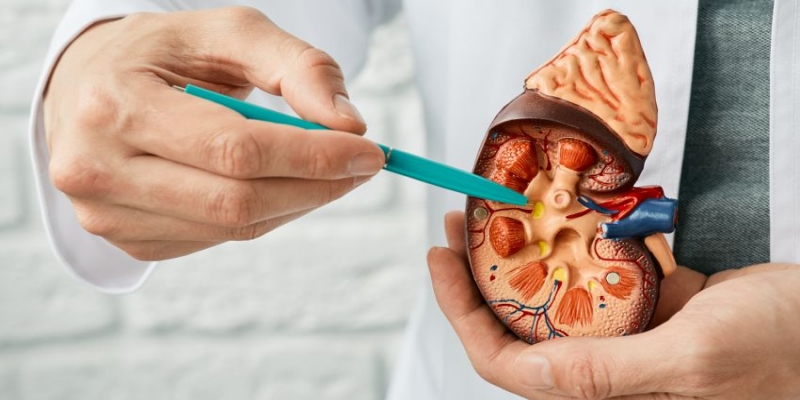Recognizing Kidney Cancer Warning Signs and Symptoms: Understanding the Indicators of Renal Health
2024-03-21 / RG STONE HOSPITAL / Kidney Cancer

Introduction: Kidney cancer, although relatively rare compared to other types of cancer, can be a serious condition if not detected and treated early. Understanding the signs and symptoms of kidney cancer is crucial for early diagnosis and effective management. In this comprehensive guide, we'll delve into the warning signs and symptoms of kidney cancer, empowering readers to recognize potential indicators of this disease.
Understanding Kidney Cancer:
Before discussing the warning signs and symptoms, it's important to have a basic understanding of kidney cancer. Renal cell carcinoma (RCC) is the most common type of kidney cancer, accounting for about 90% of cases. Other less common types include transitional cell carcinoma and Wilms tumor, which primarily affects children. Kidney cancer typically originates in the small tubes of the kidneys and can spread to other organs if left untreated.
Signs of Kidney Cancer:
-
Blood in Urine (Hematuria): One of the most common signs of kidney cancer is the presence of blood in the urine. This may appear pink, red, or cola-colored and may be accompanied by other urinary symptoms such as pain or burning during urination.
-
Abdominal Mass or Lump: In some cases, kidney tumors can be palpable and may manifest as a mass or lump in the abdomen. However, not all kidney tumors are large enough to be felt externally, so this symptom may not always be present.
-
Persistent Pain in the Side or Back: Kidney cancer can cause persistent pain or discomfort in the side or lower back region. This pain may be dull and aching or sharp and stabbing, and it may worsen over time as the tumor grows.
-
Unexplained Weight Loss: Unintended weight loss can be a sign of various underlying health conditions, including kidney cancer. As the body expends energy to combat cancer growth, it can lead to unintentional weight loss despite normal eating habits.
-
Fatigue and Weakness: Chronic fatigue and weakness are common symptoms of many types of cancer, including kidney cancer. Cancer-related fatigue is often debilitating and may not improve with rest, affecting overall quality of life.
Cancer of the Kidneys Symptoms and Signs:
When discussing symptoms and signs of kidney cancer, it's essential to recognize that these manifestations can vary from person to person. While some individuals may experience classic symptoms such as hematuria or abdominal pain, others may present with more subtle indicators or may remain asymptomatic until the cancer reaches an advanced stage. Therefore, it's important to be vigilant and seek medical attention if any concerning symptoms arise, especially if they persist or worsen over time.
Warning Signs of Kidney Cancer:
In addition to the specific signs and symptoms mentioned above, there are several warning signs that may indicate a heightened risk of kidney cancer or warrant further evaluation:
-
Family History: Individuals with a family history of kidney cancer or certain genetic conditions, such as von Hippel-Lindau disease or hereditary papillary renal cell carcinoma, may be at increased risk and should be vigilant about monitoring for symptoms.
-
Smoking: Tobacco use is a significant risk factor for kidney cancer, with smokers being twice as likely to develop the disease compared to nonsmokers. Therefore, individuals who smoke should be aware of this risk and consider quitting to reduce their chances of developing kidney cancer.
-
High Blood Pressure: Chronic hypertension (high blood pressure) has been associated with an increased risk of kidney cancer. Therefore, individuals with hypertension should be mindful of this risk factor and discuss appropriate screening measures with their healthcare provider.
-
Obesity: Obesity is another modifiable risk factor for kidney cancer, with overweight and obese individuals being at increased risk compared to those with a healthy weight. Maintaining a healthy weight through diet and exercise can help reduce the risk of kidney cancer and improve overall health.
-
Occupational Exposure: Certain occupational exposures, such as to chemicals or substances used in the manufacturing industry, may increase the risk of kidney cancer. Individuals working in these industries should be aware of potential hazards and take appropriate precautions to minimize exposure.
Conclusion: Recognizing the warning signs and symptoms of kidney cancer is essential for early detection and timely intervention. While some symptoms, such as blood in the urine or abdominal pain, may raise immediate concerns, others, such as fatigue or unexplained weight loss, may be more subtle and easily overlooked. It's important for individuals to be vigilant about monitoring their health and to seek medical attention if they experience any concerning symptoms, especially if they have known risk factors for kidney cancer. Early diagnosis and treatment can significantly improve outcomes and increase the chances of successful treatment and recovery.
Categories
Hernia Repair
Appendicitis
Piles
Urological Treatment
Hernia treatment
Enlarged Prostate (BPH)
Gall Bladder Stone
Urinary / Kidney Stone
Vitamins
Indian Health Care System
Exercise
Obesity
Female Urinary Incontinence
Single Incision Laparoscopic Surgery (SILS)
Kidney Cancer
Bladder Cancer
Ovarian cancer
Nephrology
Bariatric Surgery
Kidney Function Test
Female Urology
Radiation Therapy
Alcoholic Fatty Liver
Liver disease
Gastroenterology
Kidney Disease

